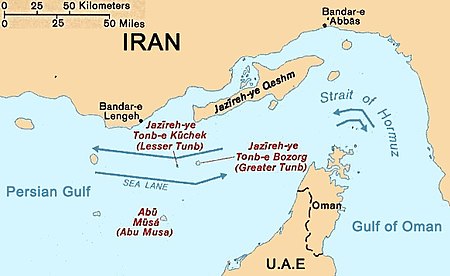Russia Upsets Iran Over UAE Persian Gulf Islands Stance
Tehran has summoned Russia’s ambassador to complain over a Moscow-endorsed statement on three Gulf islands disputed by Iran and the United Arab Emirates.
The three isles of Abu Musa, Greater Tunb and Lesser Tunb are claimed by both Tehran and the UAE; but have been held by Iran since 1971 — during the time of the UAE’s formation, after gaining independence from Britain.
The UAE renewed demands for the three islands, with UAE Minister of State for International Co-Operation Reem al-Hashimy telling the U.N. General Assembly in September last year that “despite the UAE’s sincere calls to peacefully resolve this conflict over the past five decades, we stress here that Iran has not responded. We will never relent in voicing our claim to these islands either through direct negotiations or through the International Court of Justice, as is our legitimate right.”
The UAE joins fellow economic Middle East heavyweights Saudi Arabia, Oman, Bahrain, Kuwait and Qatar in the Gulf Cooperation Council. Following a ministerial meeting in Moscow on Monday, Russia and the GCC released a joint statement that urged a diplomatic solution to the territorial dispute.

“The ministers affirmed their support for all peaceful efforts, including the initiative of the United Arab Emirates and its endeavours to reach a peaceful solution to the issue of the three islands, Greater Tunb, Lesser Tunb and Abu Musa, through bilateral negotiations or the International Court of Justice, in accordance with the rules of international law and the United Nations Charter, to resolve this issue is in accordance with international legitimacy,” it said, according to the state-owned Saudi Press Agency.
Iran recognized the compulsory jurisdiction of the U.N.’s International Court of Justice late last month, but Tehran’s ministry of foreign affairs rejected the statement on Tuesday.
“These islands belong to Iran forever and issuing such statements is in contradiction with the friendly relations between Iran and its neighbors,” said Nasser Kanaani, spokesperson for the Iran’s ministry of foreign affairs.
“The Islamic Republic of Iran emphasizes the continuation of the policy of good neighborliness and mutual respect, and considers the development and stability of the region to be the collective responsibility of the countries of the region.”
Iranian officials called on Russia to correct its position on the territorial row, according to the state-owned Islamic Republic News Agency. The Russian and Iranian foreign ministries did not immediately respond to requests for comment.
Moscow is not Iran’s only key partner to wade into hot waters over the three Gulf islands dispute. In December, the ambassador of major Iranian oil buyer China was likewise summoned by Tehran, after Beijing signed a GCC statement that claimed “support for all peaceful efforts, including the initiative and endeavours of the United Arab Emirates to reach a peaceful solution to the issue of the three islands; Greater Tunb, Lesser Tunb, and Abu Musa, through bilateral negotiations in accordance with the rules of international law, and to resolve this issue in accordance with international legitimacy.”
The dispute dates back to 29 November 1971, shortly before the end of the British protectorate and the formation of the United Arab Emirates, Iran and the ruler of Sharjah signed a memorandum of understanding (MoU) for the joint administration of Abu Musa. Under the MoU, Sharjah was to have a local police station on Abu Musa and Iran was to station troops on the island according to a map attached to the MoU. Iran and Sharjah were each to have full jurisdiction in the designated areas and their flags were to continue to fly. The MoU provided for equal distribution of petroleum oil revenues. It has been noted that the ruler of Sharjah had no other feasible option but to sign the MoU, as he either had to negotiate to save part of his territory or forego the restoration of the remaining part of the island. On the same day Iran occupied the Greater and Lesser Tunbs, and a day later, Iran seized Abu Musa.
Greater Tunb has a surface of 10.3 km2 (4.0 sq mi), with it known for its red soil. There is reported to be an Iranian garrison and naval station, an aircraft runway, a fish storage facility and a red-soil mine. Lesser Tunb has a surface of 2 km2 (0.77 sq mi) and is uninhabited with the exception of a small airfield, harbour, and entrenched Iranian military unit.
Related Reading
- Russia and Iran – 2023 Bilateral Trade and Investment Dynamic
- Russia And UAE To Discuss EAEU Free Trade Agreement
About Us
Middle East Briefing is one of five regional publications under the Asia Briefing brand. It is supported by Dezan Shira & Associates, a pan-Asia, multi-disciplinary professional services firm that assists foreign investors throughout Asia, including through offices in Dubai (UAE), China, India, Vietnam, Singapore, Indonesia, Italy, Germany, and USA. We also have partner firms in Malaysia, Bangladesh, the Philippines, Thailand, and Australia.
For support with establishing a business in the Middle East, or for assistance in analyzing and entering markets elsewhere in Asia, please contact us at dubai@dezshira.com or visit us at www.dezshira.com. To subscribe for content products from the Middle East Briefing, please click here.





